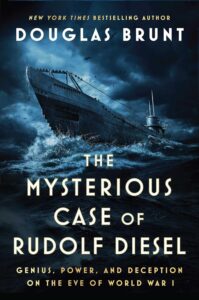
Unanswered Questions: Churchill and Rudolf Diesel
Excerpted from “Did Churchill’s Admiralty Try to Recruit Rudolf Diesel?” Written by Michael Richards (RML pen name) for the Hillsdale College Churchill Project. For the original article with endnotes, click here. To subscribe to weekly articles from Hillsdale-Churchill, click here and scroll to bottom. Enter your email in the box “Stay in touch with us.” We never spam you and your identity remains a riddle wrapped in a mystery inside an enigma.
Q: Was there a Churchill-Diesel relationship?
A Hillsdale colleague refers us to an excellent 2023 book, The Mysterious Case of Rudolf Diesel, by Douglas Brunt…
Diesel vanished from the steamship Dresden while crossing from Belgium to England on 29 September 1913. Theories on the cause include accident, suicide or murder. On the eve of the Great War, the German government was anxious to maintain its progress on Diesel propulsion.
Douglas Brunt speculates that Diesel was being wooed or recruited as an asset of the British government, in particular by First Lord of the Admiralty Winston Churchill. He offers no documentary proof, but points to a great degree of circumstantial evidence. Churchill’s incentive may have arisen from British problems developing Diesel engines for submarines. Obviously it would be a great advantage to have the inventor’s services.
A: Inconclusive
 Douglas Brunt makes a good case for Diesel being murdered or thrown overboard by German agents, presumably to keep his talents from falling into British hands. We consulted our sources, including every word of Churchill’s in print or archived. There are forty hits for “Diesel.” A few testify to British anxiety that the Germans would steal a march with Diesel propulsion of military vessels or vehicles.
Douglas Brunt makes a good case for Diesel being murdered or thrown overboard by German agents, presumably to keep his talents from falling into British hands. We consulted our sources, including every word of Churchill’s in print or archived. There are forty hits for “Diesel.” A few testify to British anxiety that the Germans would steal a march with Diesel propulsion of military vessels or vehicles.
We found only one reference involving Churchill, by the historian R.W. Thompson in 1963. It concerns Churchill’s initial activities as First Lord of Admiralty after his appointment in October 1911. From The Yankee Marlborough (London: George Allen and Unwin, 1963), 164:
Churchill, now with the aid of Lloyd George, Chancellor of the Exchequer, laid down two keels to one in competition with the Germans. It was not only a question of ships, but of types of ships, of propulsion and fuel, of armament, of the development of submarines and a naval air arm.
Rudolf Diesel had probably revolutionised propulsion, and with that coal, and even oil, might become obsolete. The internal combustion engine might rule the world, and the old “steam” empires were in a new race which might be dominated by science and technology.
It was an unpleasant thought. A constant stream of new and unknown factors, and problems of obsolescence, were constantly hampering the planners of weapons and strategy in a manner previously unknown, and undreamt of.
“Why Coal Must Go”
Jacky Fisher, the retired Admiral whom Churchill brought back as his First Sea Lord in 1914, was the driving force behind the Royal Navy’s conversion from coal- to oil-fired warships. But Fisher was also a proponent of internal combustion engines (including Diesels) for smaller craft.
On 4 October 1912, when Churchill was actively courting Fisher to take charge of oil conversion project. the Admiral wrote a memorandum: “A New Navy: Why Coal Must Go, Why the Internal Combustion Engine is Vital.” Sent to Churchill, it is a characteristic example of Fisher’s fervent prose
The enclosed, written for some of our faltering colleagues, may amuse you. Don’t send it to the Daily Mail. It’s written currente calamo as you will observe. On Nov. 26, 1910, every newspaper in America reported at length my words that the nation which first adopted Internal Combustion Propulsion would sweep the board commercially as well as pugnaciously!….
The British Admiralty is going to see a German battle-cruiser going round the Earth without refuelling in eighteen months from now, and all our wonderful marine engineers are simply servile copyists of a damned skunk called Diesel! And we haven’t got a workman or a metallurgist who is capable to produce anything approaching the foreign article.
I am going to become a naturalized Jew and go to Palestine as I think the end of the world must be near and the last trump begins there and I want to get in first somewhere!”
Archival resources
The Churchill Archives Centre at Cambridge holds several Fisher-Churchill letters on coal-oil conversion. None, however, mention Rudolf Diesel—not surprising if his help was being sought surreptitiously.
There is no doubt that British naval thinkers were concerned that Germany might be first with Diesel-propelled submarines. The engine was also ideal for Churchill’s idea of “land caterpillars” (tanks). But we found no evidence of Churchill’s interest in Rudolf Diesel himself.
It is known that Diesel boarded the Dresden that fatal October in 1913 intending to meet with the British about licensing his invention. By then Churchill and Fisher were well along on the conversion from coal to oil for capital ships, and WSC had secured an oil supply through the Anglo-Persian Oil Company. How far Diesel developments had affected designs for submarines or Churchill’s “landship” (the tank) bears further investigation.
Diesel links
Douglas Brunt interview about his book by Charles C.W. Cooke, 2023.
“‘OMG’: Churchillian Origins of the Popular Texter’s Phrase,” 2023.
“Dardanelles Straits, 1915: Success Has a Thousand Fathers,” 2024.
Marcus Frost, “Churchill’s ‘Landship’: The Tank,” 2016.
Christopher H. Sterling and Richard M. Langworth, Review of Barry Gough’s Churchill and Fisher: Titans of the Admiralty, 2018.







One thought on “Unanswered Questions: Churchill and Rudolf Diesel”
I am currently reading Douglas Brunt’s book. It is a fascinating read, and I highly recommend it!
Comments are closed.